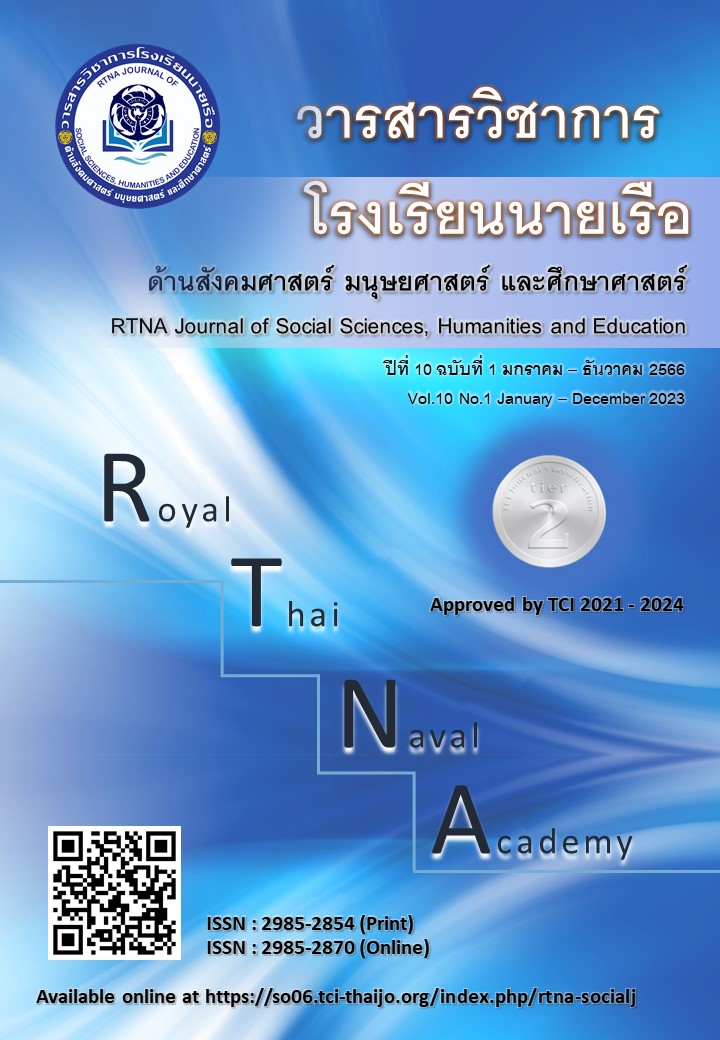Army Cadets of Chulachomklao Royal Military Academy’s Key Competencies for Sustainability
Keywords:
Key Competencies for Sustainability, Sustainable Development GoalsAbstract
This research aimed at studying the level and comparing the key competencies for cadet sustainability. The study was about quantitative research and the sample was 150 cadets in academic year 2565 from 2nd to 4th class. The cadets had been pursuing bachelor degree of arts in social sciences for development from Chulachomklao Royal Military Academy. Research instruments were questionnaires. Statistic which were frequency, percentage, mean, standard deviation was tools for data analysis. One-way analysis of variance (One-Way ANOVA) was for statistical data analysis using a package program to analyze the data. The results showed that the key competencies for the sustainability of cadets comparing the UNESCO Key Competencies for Sustainability, was the highest level. The highest three Key Competencies were system thinking, self-awareness, and collaboration whereas the lowest key competency for sustainability was Normative competency, which was at high level on only one side. Therefore, normative competence should be improved by educational management. This will lead to understanding and reflecting patterns, values, and linking to the Sustainable Development Goals.
References
กาญจนา เงารังษี. (2559). การศึกษากับการพัฒนาที่ยั่งยืน. วารสารสมาคมนักวิจัย, 21(2), 13-18.
ชล บุญนาค. (2565). SDG Insights|ปรัชญาของเศรษฐกิจพอเพียงในฐานะที่เป็นเส้นทางไปสู่การบรรลุเป้าหมายการพัฒนาที่ยั่งยืน. สืบค้นจาก https://www.sdgmove.com/2022/04/30/sdg-insights-sep-a-path-towards-achieving-sdgs-analysis-and-policy-recommendations/
ตวงพร ศรีชัย, ธีรภัทร กุโลภาส และพฤทธิ์ ศิริบรรณพิทักษ์. (2563). สมรรถนะนายทหารสัญญาบัตร กองทัพบกไทยในศตวรรษที่ 21. วารสารสมาคมนักวิจัย, 25(1), 54.
พระราชบัญญัติว่าด้วยวินัยทหาร พ.ศ. 2476. (20 สิงหาคม 2476). ราชกิจจานุเบกษา. เล่ม 50 หน้า 473-486. สืบค้นจาก https://ratchakitcha.soc.go.th/documents/1095598.pdf
ภาวดี เหมทานนท์ และอมาวสี อัมพันศิริรัตน์. (2563). ผลของรูปแบบการเรียนรู้ด้วยวิธีสะท้อนคิดต่อการตระหนักรู้ในตนเองในนักศึกษาพยาบาล. วารสารมหาจุฬานาครทรรศน์, 7(7), 275-288.
โรงเรียนนายร้อยพระจุลจอมเกล้า. (2563ก). ปรัชญา วิสัยทัศน์ พันธกิจ. สืบค้นจาก https://www.crma.ac.th/vision
โรงเรียนนายร้อยพระจุลจอมเกล้า. (2563ข). หลักสูตรศิลปศาสตร์บัณฑิต สาขาวิชาสังคมศาสตร์เพื่อการพัฒนา (หลักสูตรปรับปรุง พ.ศ. 2563). สืบค้นจาก http://socialdept.crma.ac.th/resources/pdf/SS-2563.pdf
สหประชาชาติ. (2557). เป้าหมายการพัฒนาอย่างยั่งยืน. สืบค้นจาก https://thailand.opendevelopmentmekong.net/th/topics/sustainable-development-goals/
อารีย์วรรณ สุทธิพงศ์พันธ์ และปองสิน วิเศษศิริ. (2562). การรับรู้ ทัศนคติ และแนวทางการปฏิบัติของ นักเรียนนายร้อยต่อแนวคิดประเทศไทย 4.0. วารสารสถาบันวิชาการป้องกันประเทศ, 10(1), 37-51.
Pálsdóttir, A., & Jóhannsdóttir, L. (2021). Key Competencies for Sustainability in University of Iceland Curriculum. Sustainability, 13(16), 8945. MDPI AG. Retrieved from http://dx.doi.org/10.3390/su13168945
UNESCO. (2015). Global Citizenship Education: Topics and Learning Objectives, UNESCO: Paris, France.
UNESCO. (2017). Education for Sustainable Development Goals: Learning Objectives, UNESCO: Paris, France.
Downloads
Published
Issue
Section
License
Copyright (c) 2023 2023

This work is licensed under a Creative Commons Attribution-NonCommercial-NoDerivatives 4.0 International License.
The author has the sole responsibility for the material published in RTNA Journal of Social Sciences, Humanities, and Education, which the editorial team may not agree on that material.
RTNA Journal of Social Sciences, Humanities, and Education owns the copyright of the text, the illustration, or other material published in the journal. No parts or the whole of the material published may be disseminated or used in any form without first obtaining written permission from the academy.






